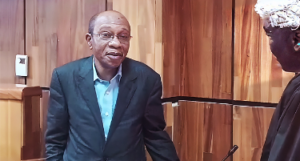The trial of former Central Bank Governor Godwin Emefiele continued on Wednesday at the Lagos High Court in Ikeja, with significant testimony provided by Ifeoma Ogbonnaya, the business relationship manager at Zenith Bank Plc. Picking up from her previous testimony on Tuesday, Ogbonnaya’s statements focused on the lack of direct involvement by Emefiele and his wife in certain company accounts under scrutiny.
During the cross-examination by Emefiele’s counsel, Senior Advocate of Nigeria (SAN) Olalekan Ojo, Ogbonnaya reaffirmed that neither Godwin Emefiele nor his wife were signatories to the accounts of the private companies Limelight Multidimensional Services Ltd, Comec Support Services Ltd, and Andswin Resources Ltd. She emphasized that all transactions involving these companies required approval from Mrs. Margaret Emefiele before being processed.
“I still maintain that Mrs. Margaret Emefiele gave me instructions through phone calls, WhatsApp chats, and my official email,” Ogbonnaya told the court. She explained that she had saved Mrs. Emefiele’s contact details under the name ‘Margo’ on her iPhone 11, and though Mrs. Emefiele had multiple phone numbers, Ogbonnaya could only recall her foreign number: +447941835451.
Ogbonnaya detailed the standard procedures followed for banking instructions, highlighting that instructions to banks must be in writing, not oral. Before appearing in court, she had reviewed the account opening documents for the three companies in question. She reiterated that neither Godwin Emefiele nor his wife appeared as shareholders or signatories to the corporate accounts of these companies.
“The shareholders of Limelight Multidimensional Ltd were Mr. Stephen Ogwa, Patricia Essan, Bruce Olotu, Agustina Omoile, Oriekose Agustina, and Ibrahim Oluwadamilare,” Ogbonnaya stated. She further noted that Bruce Olotu held the highest share of 600,000 in Limelight Multidimensional Ltd.
 Ogbonnaya firmly asserted that she did not encounter any document indicating Mrs. Emefiele as a direct beneficial owner of the corporate accounts. She explained the regulatory requirements for collecting information on beneficial owners of corporate accounts, known as the Know Your Customer (KYC) process, and clarified that she was not involved in the initial account openings. When the former relationship officer left, she continued managing the relationship based on the established protocols.
Ogbonnaya firmly asserted that she did not encounter any document indicating Mrs. Emefiele as a direct beneficial owner of the corporate accounts. She explained the regulatory requirements for collecting information on beneficial owners of corporate accounts, known as the Know Your Customer (KYC) process, and clarified that she was not involved in the initial account openings. When the former relationship officer left, she continued managing the relationship based on the established protocols.
“KYC involves a platform through which banks collect information on the beneficial owner of an account,” she explained. “When the former relationship officer left, I continued the relationship based on what the previous relationship officer had been managing.”
Ogbonnaya also confirmed that financing risk assessment is part of the KYC process and that the documentation pertaining to this was before the court. She reassured that Zenith Bank followed all guidelines regarding the deposit and withdrawal of funds in the course of running its banking business.
The trial has drawn considerable attention, with Ogbonnaya’s testimony providing critical insights into the operational protocols at Zenith Bank and the involvement—or lack thereof—of the Emefieles in the financial activities of the companies in question. As the trial progresses, further testimonies and cross-examinations are expected to shed more light on the case.




